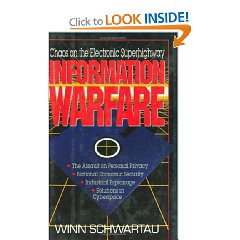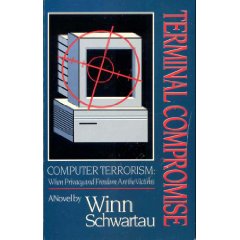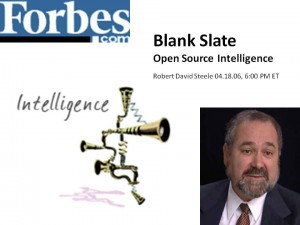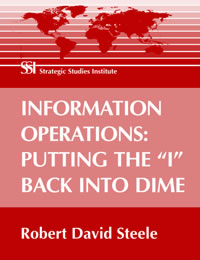 Nobel-Level Introduction, Can Be Read at Advanced Level
Nobel-Level Introduction, Can Be Read at Advanced Level
September 6, 2007
Manfred Stansfield
In my view, this is a Nobel Peace Prize level of reflection that demands broad digestion. This is USEFUL.
I was immediately impressed by the early portion of the book, at which point I went to the back and reviewed the bibliography, which is an impressive mix of philosophical, scientific, documented conspiracy, and systems thinking.
The author takes the trouble to describe his bouncing around different school systems, which is a completely credible way of explaining how he came early on to understand that most teachers are teaching belief rather than reality.
The book provides an easily-read clear-cut solution for eradicating the ten high-level threats identified by the United Nations (LtGen Dr. Brent Scowcroft representing the USA). This book is a perfect complement to [Collapse of Complex Societies]. I am especially taken with how the author shows paradigms in all their relevance to the human condition and to optimizing society.
There are 23 figures, all of them helpful to the architects of the EarthGame(tm) who wish to focus on reality including the charting of belief systems as they differ from reality.
The author teaches us that paradigms, and the ability to think in paradigmatic terms, are essential to:
1) Achieve the desired outcomes efficiently; and
2) AVOID the bias, corruption, disinformation, manipulation, and withholding of information that is so characteristic of Rule by Secrecy: The Hidden History That Connects the Trilateral Commission, the Freemasons, and the Great Pyramids and The Pathology of Power – A Challenge to Human Freedom and Safety.
The purpose of paradigms is to help human manipulate (sic) the environment. The author states and only one in ten thousand understands what a paradigm is, and laments the reality that when a paradigm in power (e.g. the neoconservative paradigm) does not parallel reality, humanity suffers in catastrophic terms.
The author points out that the prevailing Machiavellian paradigm of exploiting people continues to displace the more appropriate non-violent collaborative community paradigms of Gandhi, Martin Luther King, and Nelson Mandela.
His list of failing paradigms is extraordinary; in the comments section I provide a link to my own Op-Ed on this matter written before I bought this book. He specifies:
* Education
* Employment
* National Debt
* Environment
* Food Supply
* Sick Care
* Exclusive versus Inclusive Society
* Failure of the Communist Model (allows immoral capitalism to avoid social costs)
* Event manipulation, disinformation, and cover-up.
Separately the author discusses the failure of the US financial paradigm of debt, arms subsidies, and foreign adventurism that are all unaffordable and unsustainable. The Comptroller General of the USA agrees with him, and recently informed Congress that the USA is officially “insolvent.” I am NOT making this up.
The author describes paradigms as essential sense-making, pattern detecting, anomaly isolating frames of reference, and tells us there are four categories:
1) Action
2) Communication
3) Information
4) Societal
Paradigms, the author tells us, consist of factors and relationships and are best maintained by:
1) Optimizing the Truth Quotient
2) Keeping it current
3) Eliminating bias
4) Retiring & replacing as needed
Only paradigmatic thinking (along with reading, writing, mathematics, and ethics) should be taught. People need to learn how to take a “360° look” at any issue, and to recognize competing paradigms and belief systems.
The author tells us that today's real battle is not over or between paradigms, but among the larger existential challenges to Humanity:
1) Truth versus Deception
2) Survival versus Extinction
3) Enlightenment versus Exploitation
4) Living the Dream versus the Nightmare of Subsistence
5) Doing Your Thing versus Doing Someone Else's Thing
Human integrate four distinct forms of knowing and doing:
1) Body
2) Mind
3) Spirit
4) Emotion
Perceptions are biases by
1) Dimensionality
2) Paradigm filters
3) Perceptors
4) Vested interests
Efficacy is the only proof of a paradigm. The following are NOT “proof” of a paradigm: authority, legislation, logic, conviction, eloquence, poetry, rhetoric, polemics, magic tricks, ridicule, ad hominum attacks, cartoons, art, theatrics, hysteria, religion, terrorism, extortion, monopoly, fanaticism, science, law suits, nor mathematics.
Four primary paradigms that are in competition but can also be blended:
1) Authoritarian
2) Scientist
3) Empiricist (engineer that “does”)
4) New Age
The author states that children have a right to be taught the truth and be taught unbiased paradigms.
Among the most terribly failed paradigms in USA the author cites, in addition to health, the Federal Reserve which usurps the Constitutional role of the US Treasury; the abdication by Congress of its Article 1 responsibilities (see The Broken Branch: How Congress Is Failing America and How to Get It Back on Track (Institutions of American Democracy) andBreach of Trust: How Washington Turns Outsiders Into Insiders; and the war on drugs, which is actually a profit-making enterprise for off the books operations (see Dark Alliance: The CIA, the Contras, and the Crack Cocaine Explosion and Lost History: Contras, Cocaine, the Press & ‘Project Truth')
The author ends on an optimistic note, but states that at this time more information is being withheld (unlawfully) from citizens, than is available to citizens. Quite right.
He posits the need to balance among the social roles of dreamer, seeker, exploiter, consumer, referee, and operator, while hoping for the eradication of the perverter (see The One Percent Doctrine: Deep Inside America's Pursuit of Its Enemies Since 9/11 and Vice: Dick Cheney and the Hijacking of the American Presidency)
He ends by defining how to optimize society, suggesting that only four basic skills are needed: reading & writing; mathematics; computer & communications technology end-user skill; and the ability to recognize & evaluate paradigms. He lists 12 occupational categories of importance to a society:
1) Food producer
2) Shelter builder
3) Species reproducer/maintainer
4) Dimensionality increaser
5) Paradigm teacher
6) Environmental preserver
7) Artifact builder
8) External societal defender
9) Internal societal greaser
10) Trader
11) Entertainer
12) Personal fixer (in his view, an honest society with open books and proper health care would eliminate the need for most doctors, lawyers, and accountants).
This is a very serious book by a very serious intellect. It could have “break-out” consequences as we move forward with the EarthGame(tm) and I certainly commend the book to anyone seeking to reflect on how we can displace all the liars and thieves that we have elected or allowed to run corporations that are publicly traded.
See also
The Structure of Scientific Revolutions
The Social Construction of Reality: A Treatise in the Sociology of Knowledge









